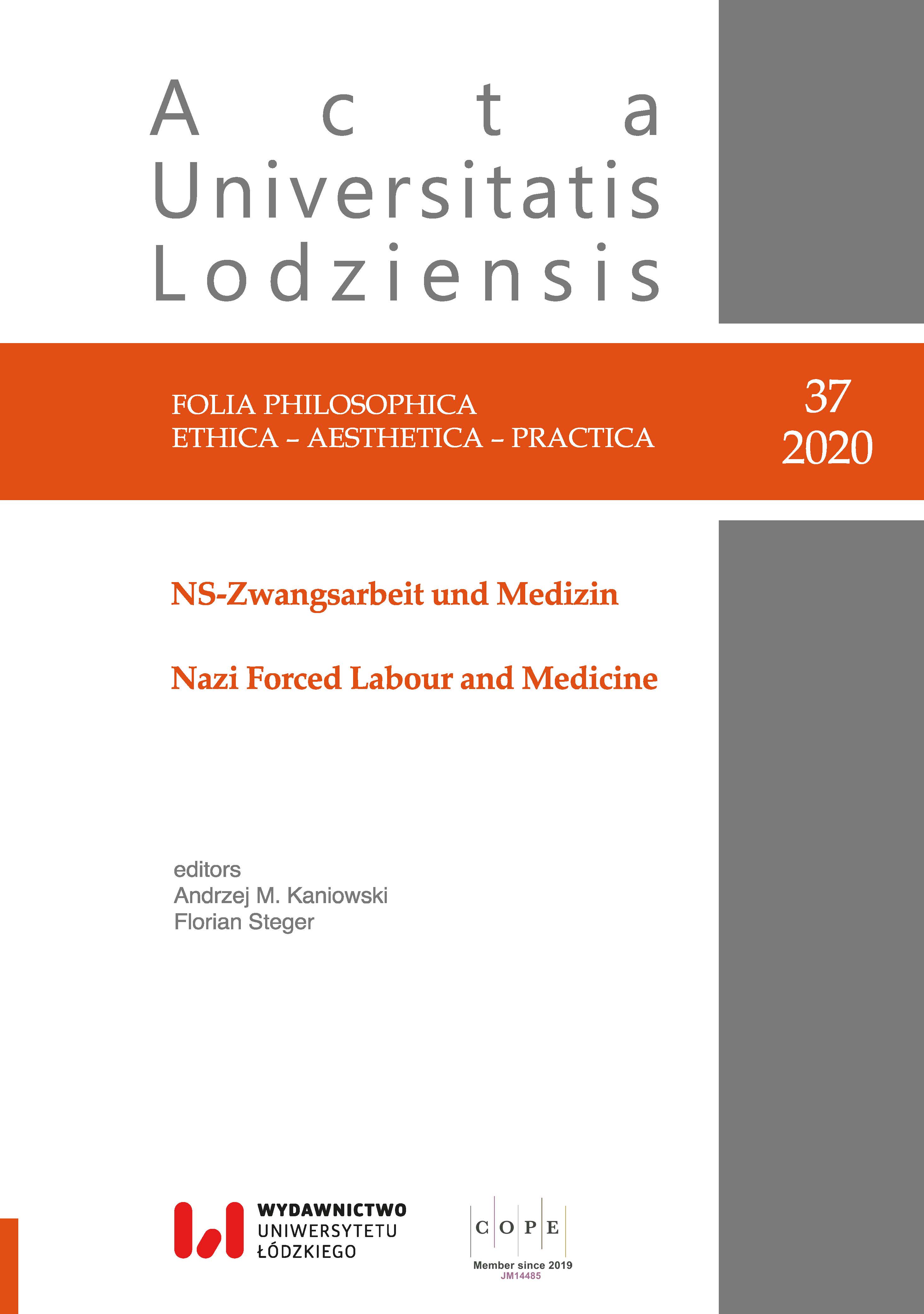Between the Projection of Danger, Objectification, and Exploitation. Medical Examination of Polish Civilian Forced Laborers before their Deportation into the German Reich
DOI:
https://doi.org/10.18778/0208-6107.37.04Słowa kluczowe:
Nazi forced labor, medical examination, work ability, objectificationAbstrakt
Before crossing the German border, Polish civilian forced laborers who had been recruited for work in Nazi Germany had to undergo medical examination and delousing. The German authorities wanted to ensure that they deported only able-bodied persons to Germany who had been examined for being free from infectious diseases and vermin. In this paper, I explore to what extent the medical examinations may be regarded as strategies for the objectification and dehumanization of the forced laborers. Focus is put on the question of how the Nazi authorities defined “work ability” because the medical assessment was decisive for the choice and selection of foreign manpower. As it turns out, the definition of work ability was essentially determined by factors such as the need for manpower, force, and oppression. Thus, I put the medical assessment of the forced laborers’ work ability into the context of Nazi ideology and economic policy.
Bibliografia
Dierl, Florian, Zoran Janjetović, and Karsten Linne. Pflicht, Zwang und Gewalt. Arbeitsverwaltungen und Arbeitskräftepolitik im deutsch besetzten Polen und Serbien 1939–1944. Essen: Klartext Verlag, 2013.
Google Scholar
Hallama, Eva. “‘Wir waren irgendwie zu Anderen geworden, als hätte man uns ausgetauscht.’ Medizinische Musterungen, Scham und Verdinglichung im Kontext der NS-Zwangsarbeit.” In Strukturen und Netzwerke. Medizin und Wissenschaft in Wien 1848–1955, edited by Daniela Angetter, Birgit Nemec, Herbert Posch, Christiane Druml, and Paul Weindling, 653–668. Göttingen: V&R Unipress, 2018.
Google Scholar
DOI: https://doi.org/10.14220/9783737009164.653
Heinemann, Isabel. Rasse, Siedlung, deutsches Blut. Das Rasse- & Siedlungshauptamt der SS und die rassenpolitische Neuordnung Europas. Göttingen: Wallstein Verlag, 2003.
Google Scholar
Herbert, Ulrich. “Zwangsarbeit im 20. Jahrhundert. Begriff, Entwicklung, Definitionen.” In Zwangsarbeit in Hitlers Europa. Besatzung, Arbeit, Folgen, edited by Dieter Pohl and Tanja Sebta, 23–36. Berlin: Metropol, 2013.
Google Scholar
Kayser, H. “Ärztliche Erfahrungen bei der Planung von Durchganglagern für ausländische Arbeitskräfte.” Arbeitseinsatz und Arbeitslosenhilfe 21/24 (1943): 127–129.
Google Scholar
Linne, Karsten. “Struktur und Praxis der deutschen Arbeitsverwaltung im besetzten Polen und Serbien 1939–1944.” In Zwangsarbeit in Hitlers Europa. Besatzung, Arbeit, Folgen, edited by Dieter Pohl and Tanja Sebta, 39–61. Berlin: Metropol, 2013.
Google Scholar
Schäfer, Annette. “Durchgangs- und Krankensammellager im Zweiten Weltkrieg. Schnittstellen zwischen ‘Arbeit’ und ‘Vernichtung’ beim Zwangsarbeitereinsatz.” In Medizin und Zwangsarbeit im Nationalsozialismus. Einsatz und Behandlung von “Ausländern” im Gesundheitswesen, edited by Andreas Frewer and Günther Siedbürger, 203–230. Frankfurt am Main: Campus, 2004.
Google Scholar
Schäfer, Annette. “Zur Funktion von Durchgangslagern und Krankensammellagern beim Zwangsarbeitereinsatz im Zweiten Weltkrieg. Am Beispiel Württemberg.” In Medizin und Verbrechen. Festschrift zum 60. Geburtstag von Walter Wuttke, edited by Christoph Kopke, 143–162. Ulm: Klemm & Oelschläger, 2001.
Google Scholar
Seidel, Robert. “Arbeitskräfteerfassung, Ausbeutung und Zwangsarbeit im Distrikt Radom.” In Arbeitskräfte als Kriegsbeute. Der Fall Ost- und Südosteuropa, 1939–1945, edited by Karsten Linne and Florian Dierl, 139–171. Berlin: Metropol, 2011.
Google Scholar
Pobrania
Opublikowane
Jak cytować
Numer
Dział
Licencja

Utwór dostępny jest na licencji Creative Commons Uznanie autorstwa – Użycie niekomercyjne – Bez utworów zależnych 4.0 Międzynarodowe.












